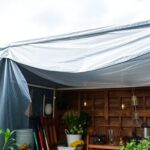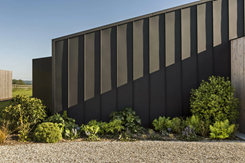As the seasons shift in Bournemouth, homeowners are often faced with the challenge of maintaining a comfortable indoor temperature while managing rising energy costs. With unpredictable coastal weather and varying temperatures, it’s more important than ever to ensure that your home remains energy-efficient throughout the year. One of the most effective ways to achieve this is by enhancing the thermal efficiency of your property, and cladding in Bournemouth offers a practical solution to achieving this goal.
Cladding is often seen as a cosmetic improvement for your home’s exterior, but it also serves a critical functional purpose—providing an additional layer of insulation to your home. With energy efficiency becoming an ever-growing concern, cladding offers significant benefits that go beyond aesthetics.
What is Cladding?
Before diving into how cladding improves thermal efficiency, it’s important to understand what cladding is and how it works. Cladding refers to the application of a protective material over the exterior walls of a building. This material can be made from a variety of substances, including timber, metal, vinyl, stone, and composite materials. The purpose of cladding is to protect the underlying structure from external weather elements, such as wind, rain, and sunlight, and to enhance the building’s appearance.
However, cladding is not only about aesthetics or protection; when installed properly, it can act as an additional layer of insulation, which plays a critical role in enhancing the thermal efficiency of your home. In areas like Bournemouth, where weather conditions fluctuate between cold, damp winters and warmer summers, investing in thermal insulation through cladding can significantly improve your home’s energy performance.
How Cladding Improves Thermal Efficiency
Thermal efficiency refers to how well a building retains heat and maintains a comfortable indoor temperature. A thermally efficient home is one that requires less energy to heat or cool, reducing overall energy consumption and associated costs. By installing cladding, homeowners in Bournemouth can enhance their property’s thermal efficiency in several key ways:
1. Additional Insulation Layer
One of the main ways cladding improves thermal efficiency is by adding an extra layer of insulation to the building. Many types of cladding, particularly composite and timber cladding, are designed with built-in insulation or can be applied over an existing layer of insulation. The material used for cladding acts as a barrier to heat loss, keeping warmth inside during the colder months and preventing heat from entering during the warmer months.
For instance, composite cladding systems often include a layer of rigid foam insulation that helps to reduce heat transfer through the walls of your property. This prevents cold air from penetrating the interior of your home, which means you will rely less on your heating system during the winter. In summer, the same cladding helps prevent excessive heat from entering the house, meaning your air conditioning system won’t have to work as hard to cool the property.
2. Reduction in Heat Loss
In the winter months, one of the most common problems homeowners face is heat loss, especially in older properties. Heat loss typically occurs through poorly insulated walls, windows, and roofs. By adding cladding to the exterior of your home, you reduce the amount of heat that escapes through the walls.
The insulating properties of cladding materials, such as composite panels or timber, ensure that the walls of your home remain at a more stable temperature, even in freezing weather conditions. This means that your home stays warmer for longer, and your heating system won’t need to work overtime to maintain the desired temperature. As a result, your energy consumption decreases, leading to lower heating bills.
3. Prevents Cold Bridging
Cold bridging, also known as thermal bridging, occurs when a material with high thermal conductivity, such as metal, allows heat to escape through the walls. This typically happens at the junctions of walls, windows, and doors, where insulation is insufficient. It can lead to cold spots inside the home and significantly affect overall thermal efficiency.
Cladding can help mitigate cold bridging by covering the external walls with a continuous layer of insulation. This means that heat is less likely to escape through weak points in the structure. For example, when cladding is installed over the existing walls, it helps create a seamless thermal barrier that reduces the risk of heat loss around window frames and other junctions, leading to more consistent indoor temperatures and improved overall thermal performance.
4. Energy Savings and Lower Bills
Perhaps one of the most appealing benefits of improved thermal efficiency is the potential for significant energy savings. With better insulation, you will need less energy to heat your home in winter and to cool it in the summer. This translates directly into lower energy bills, which can be especially important for homeowners in Bournemouth who may experience high costs during colder months.
In a typical home without additional insulation, a large amount of energy is wasted through heat loss, causing heating systems to work harder and longer to maintain a comfortable indoor temperature. By reducing the amount of energy required to heat your home, cladding can help lower your carbon footprint and reduce the reliance on fossil fuels, contributing to a greener environment.
5. Improved Comfort
By improving the thermal efficiency of your home, cladding also enhances overall comfort. Homeowners in Bournemouth can benefit from a more consistent and stable indoor climate, as cladding reduces the fluctuations in temperature that often occur when a home lacks sufficient insulation.
During the winter months, cladding helps keep the warmth inside, eliminating cold spots and drafts, which can make rooms feel chilly. In the summer, it prevents the house from overheating by blocking excess solar heat. This balance of temperature regulation ensures that your home remains comfortable all year round, with a lower reliance on artificial heating and cooling methods.
6. Sustainability and Environmental Impact
Thermal efficiency is not only beneficial for your home but also for the environment. Homes that retain heat more effectively reduce the need for energy-intensive heating systems. By choosing cladding, which often incorporates recycled materials or eco-friendly insulation options, you can lower your home’s carbon footprint.
Additionally, cladding helps to create a more sustainable living environment by reducing the demand for non-renewable energy resources. This makes cladding a great choice for eco-conscious homeowners in Bournemouth looking to reduce their impact on the environment while improving their home’s thermal performance.
7. Weather Resistance for Coastal Properties
Bournemouth’s coastal climate can be particularly harsh on homes, with high winds, salt air, and frequent rain contributing to wear and tear over time. Cladding can protect your home from these elements, acting as an additional layer of defense against the wind and water. In addition to improving thermal efficiency, cladding keeps your home’s exterior in better condition, protecting the insulation behind it from moisture and salt damage.
For homes near the coast, cladding materials such as metal or composite options are ideal because they are resistant to corrosion, ensuring that your home remains insulated and protected despite the elements.
8. Increased Property Value
As more homeowners in Bournemouth look for ways to improve their homes’ energy efficiency, properties with enhanced thermal performance are becoming increasingly desirable. Installing cladding not only makes your home more comfortable and cost-effective, but it can also increase its resale value. Homebuyers are often willing to pay a premium for homes that are energy-efficient, well-insulated, and have lower ongoing maintenance costs.
Investing in cladding can therefore be a smart long-term investment, providing both immediate benefits in terms of energy savings and comfort, as well as a return on investment when you decide to sell your property.
9. Variety of Cladding Materials for Thermal Efficiency
Cladding comes in a wide range of materials, each with different insulation properties and aesthetic appeal. Homeowners in Bournemouth have many options to choose from, depending on their style preferences and insulation needs.
-
Timber Cladding: Timber is a natural insulator, offering good thermal properties and a warm, rustic aesthetic. It helps to keep your home insulated and cozy in the winter while providing a stylish, natural look.
-
Composite Cladding: Composite materials, which combine wood and plastic, are excellent insulators. They are often designed with thermal properties that help to trap heat within your home.
-
Metal Cladding: While typically not as thermally efficient on its own, metal cladding can be paired with insulation to provide a strong and durable exterior that also contributes to energy efficiency.
-
uPVC Cladding: Low-maintenance and affordable, uPVC cladding is a popular choice for homeowners looking for insulation and protection without the upkeep required by timber.
Each material offers different benefits, so it’s important to consider the overall thermal efficiency of your home when choosing the right cladding for your property.
Conclusion: Cladding as a Key Solution for Thermal Efficiency in Bournemouth Homes
Improving the thermal efficiency of your home should be a top priority, especially in areas like Bournemouth where the climate can vary dramatically throughout the year. Cladding in Bournemouth offers an effective, affordable, and sustainable solution for homeowners looking to reduce their energy consumption, enhance comfort, and protect their property from the elements. By providing an additional layer of insulation, cladding helps maintain a consistent indoor temperature, reduce heat loss, and lower energy costs—all while improving your home’s curb appeal.
If you’re looking for a way to make your Bournemouth home more energy-efficient, cladding is a smart investment that provides long-term benefits, both in terms of comfort and cost savings. Whether you choose timber, composite, metal, or vinyl, cladding is a highly effective way to enhance your home’s thermal efficiency and create a more comfortable living space for years to come.
- How Cladding Can Improve the Thermal Efficiency of Bournemouth Homes
- In this blog, we will explore how cladding can improve the thermal efficiency of Bournemouth homes and the various advantages it offers in terms of comfort, cost savings, and sustainability.
- cladding
Related posts:
 Can Residential End of Lease Cleaning Help You Get Your Bond Back?
Can Residential End of Lease Cleaning Help You Get Your Bond Back?
 How Much Do Gutter Services Cost in Bradford in 2025 | Complete Price Guide
How Much Do Gutter Services Cost in Bradford in 2025 | Complete Price Guide
 Top-Rated Swimming Pool Remodeling in Hoover AL You Can Trust
Top-Rated Swimming Pool Remodeling in Hoover AL You Can Trust
 Hosting a Big Event? Pre & Post-Party Cleaning Tips You’ll Thank Us For
Hosting a Big Event? Pre & Post-Party Cleaning Tips You’ll Thank Us For
 Safeguard Your Home: Professional Gutter Cleaning Fairfield Keeps Water Where It Belongs
Safeguard Your Home: Professional Gutter Cleaning Fairfield Keeps Water Where It Belongs
 Control Moisture and Prevent Mildew with Transparent Tarpaulin
Control Moisture and Prevent Mildew with Transparent Tarpaulin
 Gutter Cleaning Heathmont – Safeguard Your Home with Expert Gutter Maintenance
Gutter Cleaning Heathmont – Safeguard Your Home with Expert Gutter Maintenance
 Tips for Selecting the Best Kitchen Remodeling Services For Your Home
Tips for Selecting the Best Kitchen Remodeling Services For Your Home








